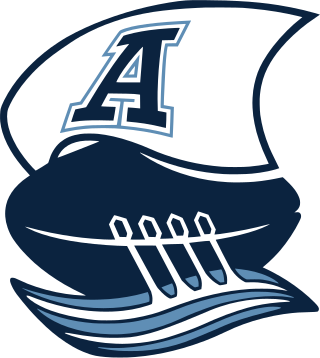
The Toronto Argonauts are a professional Canadian football team competing in the East Division of the Canadian Football League (CFL), based in Toronto, Ontario. Founded in 1873, the team is the oldest existing professional sports team in North America still using its original name, as well as the oldest-surviving team in both the modern-day CFL and East Division. The team's origins date back to a modified version of rugby football that emerged in North America in the latter half of the 19th century. The Argonauts played their home games at Rogers Centre from 1989 until 2016, when the team moved to BMO Field, the fifth stadium site to host the team.
The Toronto Argonauts won the Grey Cup for the second time in five years.
For the second consecutive season the Toronto Argonauts and Winnipeg Blue Bombers met for the Grey Cup. The Argonauts won the game.
The Winnipeg Blue Bombers played in their third consecutive Grey Cup final. A last-second rouge gave Winnipeg its second title in five years.
For the first time in Grey Cup history, the same two teams challenged for the trophy for the third consecutive year. But unlike the previous two years, the Toronto Argonauts needed some late game heroics to win their third consecutive title.
The Calgary Stampeders had an opportunity to defend their Grey Cup title in 1949, but the Montreal Alouettes returned the trophy to Quebec for just the third time in its history.
After a 17-year absence, the Saskatchewan Roughriders returned to the Grey Cup final. Their losing streak in the big game continued, however, as it was the other Rough Riders that took home the prize.
The Toronto Argonauts faced the Edmonton Eskimos in the Grey Cup. Although the Argos would hold on to win the game and their tenth Grey Cup championship, an Argo would not sip from the silver mug again until 1983.
The Ontario Rugby Football Union (ORFU) was an early amateur Canadian football league comprising teams in the Canadian province of Ontario. The ORFU was founded on Saturday, January 6, 1883 and in 1903 became the first major competition to adopt the Burnside rules, from which the modern Canadian football code would evolve.
The Hamilton Tiger-Cats defeated the Winnipeg Blue Bombers in the annual Grey Cup in 1953.
The Edmonton Eskimos defeat the Montreal Alouettes in the first Grey Cup held in the west. This was also the first year that the Grey Cup was open to professional teams only, as the amateur Ontario Rugby Football Union was not invited to compete in an inter-union playdown, leaving only the Interprovincial Rugby Football Union and the Western Interprovincial Football Union to compete for the Canadian championship.
The Sarnia Imperials were a football team from Sarnia, Ontario and a member of the Ontario Rugby Football Union, a league that preceded the Canadian Football League and contested for the Grey Cup until 1955. In their history, the Imperials appeared in three Grey Cup championship games, winning twice in 1934 and in 1936.
The Toronto Balmy Beach Beachers were a Canadian football team based in Toronto, Ontario and a member of the Ontario Rugby Football Union, a league that preceded the Canadian Football League. Spanning three decades, they appeared in four Grey Cup championships, winning twice in 1927 and 1930, and were the longest lasting member of the ORFU.
Toronto Parkdale was an amateur Canadian football and hockey club based in the Parkdale neighbourhood in the west end of Toronto. As a branch of the Parkdale Canoe Club established in August 1905, the club's hockey and football teams were nicknamed the Paddlers. They were also known colloquially as the West Enders, and as the Green and White, after the team colours.

Dr. Alexander Smirle Lawson was a Canadian football halfback who played for three years for Toronto Varsity and four years for the Toronto Argonauts. He was a two-time Grey Cup champion and an inaugural member of the Canadian Football Hall of Fame.
The 1933 Toronto Argonauts season was the club's 47th season since its inception in 1873 and its 24th season in the Interprovincial Rugby Football Union. The team finished tied with the Montreal Football Club for first place in the IRFU with an identical record of four wins and two losses, resulting in a two-game, total-points tiebreaker series which the Argos won by an aggregate score of 20-9. By virtue of this victory, the club secured its 7th IRFU championship and qualified for the playoffs for the first time since 1922. The ten-year drought was, and continues to be, the longest playoff drought in franchise history.


